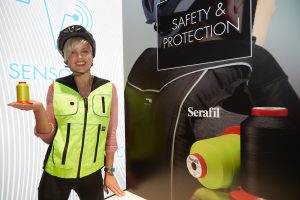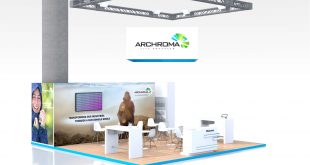
More individual, more flexible, more sustainable, faster: the processing of fashionwear, apparel and textiles for the upholstery sector and automotive industry is changing rapidly. And, at Texprocess in Frankfurt am Main, the sector presented itself in all its dynamism.
From 14 to 17 May 2019, 317 exhibitors from 34 countries (2017: 312 from 35 countries) demonstrated the latest developments in the processing of textile and flexible materials to 26,400 visitors from 96 nations, including visitors coming from Techtextil (2017: 25,100 from 109 countries). With growth in exhibitor numbers of 1.6 percent and five percent in visitor numbers, this year, Texprocess enjoyed its biggest show to date.
“The exhibitors at Texprocess once again represented all the stages in the textile production chain, from computer assisted design to cutting and seaming technologies, finishing, logistics and recycling,” says Detlef Braun, Member of the Executive Board of Messe Frankfurt. “Neither the apparel or leather-goods industries, nor furniture manufacturers or, indeed, the automotive sector can afford to ignore Texprocess.”
Strong growth in visitor numbers, especially from Europe
With 212 exhibitors from outside and 105 from within Germany, the level of international participation reached 67 percent. New this year were Finland, Denmark, Ukraine, the Dominican Republic and Singapore. The leading five countries in terms of exhibitors, after Germany, were Italy, China, Taiwan, Japan and Turkey. China, Japan and Taiwan were also represented by national pavilions.
The increased visitor numbers at Texprocess came mainly from European countries. After Germany, Italy, Turkey, France, Portugal, Romania, and Poland ranked amongst the most strongly represented nations as far as visitors were concerned. The rise in visitor numbers was due chiefly to participation from Japan, the Netherlands, Switzerland and France.
Digitalisation leads from Industry 4.0 to Impact 4.0
The overriding theme of Texprocess – subsumed under the heading ‘Impact 4.0’ – was the continuation and development of Industry 4.0, together with the changes that it brought with it as a component in the value-creation chain. A large proportion of the sector’s technology providers have, for a number of years, been working successfully on the digitalisation of the entire value creation chain, starting with 3D body scanners, 3D simulation software for collection design, robotisation and predictive maintenance in the cutting department and including the interlinking of all the sewing machines in an entire production line across national borders.
“Digitalisation and connectivity have reached the second phase in the sector. As a result of the incorporation of artificial intelligence, many processes are more easily controlled and even new business models become possible,” says Elgar Straub, Managing Director of the Textile Care, Fabric and Leather Technologies Division of German Association of Machinery and Plant Manufacturers (VDMA), consultants for and partners of Texprocess.
Ketty Pillet, Vice President, Marketing at Texprocess exhibitor Gerber Technology, confirms this, too: “Our customers were delighted to be able to check out our revolutionary digital, end-to-end solution at Texprocess. It enables them to create tailor-made and customised products in small runs. Our fully integrated process, which incorporates 3D and cloud-based PLM, takes products from design to production, at the same time as enabling the integration of digital printing. And it enables our customers to work quickly and flexibly, whilst at the same time reducing costs and storage requirements.”
Indeed, three of the four winners of the 2019 Texprocess Innovation Award received the prize for new digital solutions: Dürkopp Adler AG won over the adjudicators with the new M-Type-Delta sewing machine, which learns independently and can be integrated into fully digitalised production lines in the automotive, upholstery and leather industries. Assyst GmbH received the award for their new, innovative 3D process, which significantly alters the way the value creation chain in the textile industry functions. Lectra were singled out for their fashion-on-demand technology, the first end-to-end solution for the personalisation of fashionwear. There was, moreover, much discussion at Texprocess about the increasing use of artificial intelligence combined with cloud-based solutions in, for example, the area of machine learning. Sustainability and digital printing of textiles were also major topics of discussion at Texprocess. The fourth Texprocess Innovation Award went to Vetron Typical Europe GmbH for their ultra-light sewing unit with carbon components.
Digitalisation and inter-connectivity make processing more efficient
Digitalisation, and the inter-connectivity that goes with it, was reflected, too, in what amounted to five micro-factories in all at Texprocess. These gave the trade visitors an impression of how integrated textile processing works and where the added value lies for both processors and customers
“Micro-factories have an important role to play, particularly with regard to sustainability. Because what they produce is exactly and only what the customer is actually going to buy, micro-factories save on both waste and resources,” says Professor Meike Tilebein from the German Institutes for Textile and Fibre Research in Denkendorf (Deutsche Institute für Textil- und Faserforschung Denkendorf – DITF). “Only the components that are actually needed for the product are printed; prototypes are not created in physical form, but are, instead, sent digitally all over the world.
In collaboration with the DITF and with partners from industry, Techtextil and Texprocess showcased, in the Digital Textile Micro-factory, a total of three extensive and fully networked production lines. Line one demonstrated the manufacture of individually designed polo shirts. In line two, shoe uppers were produced using a 3D knitting process. And line three demonstrated how textile and flexible materials, such as faux leather, are processed. And there were four further micro-factories created by various different groups of Texprocess and Techtextil exhibitors, including a micro-factory for the mass production of smart textiles, overseen by the Institute for Textile Technology (Institut für Textiltechnik – ITA) at Aachen’s RWTH university, a complete solution for fashion-on-demand, led by Gertsch Consulting and Mode Vision, a partial, already completely operational solution by Gemini, as well as a micro-factory for perforating leather, set up by Ring Maschinenbau and their partners.
Digitalisation ensures sustainability and transparency
Is sustainability the key to innovation in the textile sector? The question at the heart of the Fashionsustain Conference, held within the framework of the Texprocess Forum, played an important part at Texprocess. According to Micke Magnusson, co-founder of the Swedish start-up,
We are Spindye, who gave the keynote speech, sustainable innovations in textiles are crucial to the sector’s survival. At Fashionsustain, major figures in the sector, including, amongst others, Clariant Plastics and Coatings, Indorama, Lenzing, Perpetual Global, Procalçado S.A., as well as Kering and Zalando, came together to discuss issues relating to sustainability in the textile and fashion sectors. Fashionsustain was chaired by, amongst others, Karla Magruder, founder of Fabrikology International.
Fibre manufacturers Lenzing, knitting machine producers Santoni and shoe component manufacturers Procalçado S.A subsequently went on to present the Innovation Roadshow entitled ‘The Future of Eco-Conscious Footwear Manufacturing’, which offered examples of sustainable practices in shoe manufacturing. The Roadshow was supported by Messe Frankfurt’s Texpertise Network and introduced by Marte Hentschel, founder of the B2B network for the fashion sector, Sourcebook.
The sparing use of resources and a high degree of transparency throughout the supply chain play an increasing part in the fashion and apparel industry. Software solutions and ‘smart systems’ help with the introduction of sustainable processes. They exploit the potential for optimisation across all manufacturing stages, connect with the supply chain, provide predictions for requirements already at the stage of collection development and identify necessary cutting modifications to adjust the fit.
Exhibitors Assyst presented an example of a software solution that optimises the entire product development stage, the Avalution 3D Bodyscanner System. Moreover, sustainable apparel production also involves adherence to international norms for working practices, legal regulations and agreed quality standards. Checks can be effected by, for example, some software showcased by Setlog. This cloud-based system monitors all supply relationships from order placement to delivery. And a shipment tracker is set to bring even greater transparency.
Texprocess Forum – a complete success
Once again, the Texprocess Forum, with a programme put together by various partners, proved to be a complete success. Following on from Fashionsustain, an offshoot of the Neonyt Conference came discussion of the topic ‘Impact 4.0 and the future of Industry 4.0’, organised by the Textile Care, Fabric and Leather Technologies Division of the Association of German Machinery and Plant Manufacturers (VDMA). The Programme on the Wednesday and Thursday was again designed by DTB Dialog.Trust.Business. And to conclude on the Friday, there was consideration of a series of topics proposed by the World Textile Information Network (WTiN), which included a panel discussion.
Techtextil and Texprocess: an ideal combination
Held in parallel with Texprocess, Techtextil, the leading international trade fair for technical textiles and nonwovens, drew 1,501 exhibitors from 57 countries and 42,500 visitors from 105 countries, including visitors from Texprocess, to Frankfurt’s Trade Fair and Exhibition Centre. Together, the two trade fairs welcomed 1,818 exhibitors from 59 countries (2017: 1,789 from 66 countries) and 47,000 visitors from 116 countries (2017: around 47,500 trade visitors from 116 countries).
Techtextil and Texprocess: new date for the diary
The next Techtextil and Texprocess will take place from 4 to 7 May 2021 in Frankfurt am Main.
 Tekstil Teknik Dergisi Tekstil Haberleri, Tekstil Sektörü, Tekstil Teknik
Tekstil Teknik Dergisi Tekstil Haberleri, Tekstil Sektörü, Tekstil Teknik




